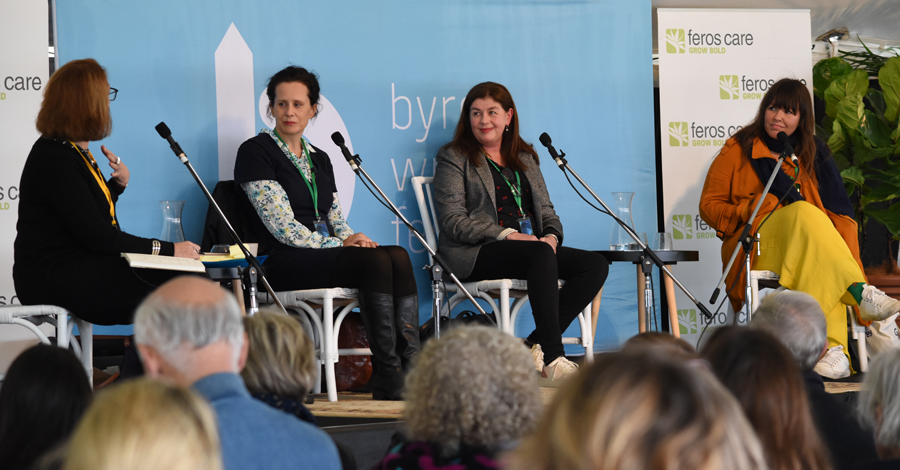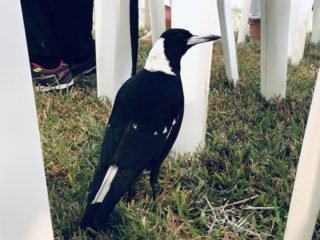Creativity, motherhood and a magpie

An audience of predominantly mothers, including a magpie, gathered in the warmth of the Feros Care Marquee to connect with a panel of talented women who manage to straddle both motherhood and writing.
From left to right, chaired by Margot Saville, the line up included Megan K Stack, Phillipa McGuinness, and Tara June Winch.
If anyone found their seat a bit lumpy, it’s because there was a little gift on each seat: a small Pukka Herbs tea tin with an assortment of five herbal teas for each patron.
This thoughtful gift was very on point, since a nourishing cup of tea always pairs well with mothers in conversation.
As the introductions kicked off, our eyes followed a flash of black and white as a magpie flew gracefully past the edge of the stage, landed, and spent the rest of the session wandering under chairs, casually foraging for grubs amongst the grass.

The grey feathers on the back of her neck indicated she is a female, and her perfectly black breast feathers suggest she is an adult; possibly preparing for her next season of chicks. She later wandered among the chairs, foraging for grubs.
The delighted audience was reminded that we are surrounded by nature at the festival, even though the marquee felt like an intimate interior space.
The magpie’s calmness and gentle cooing reflected the topics of sisterhood and connection, love and loss, being discussed on stage in this safe space.
Stack, the author of Women’s Work: a personal reckoning with labour, motherhood and privilege, began by painting a picture of how her life before children involved war correspondence and traveling around the world; working on an equal footing with her husband in the same profession.
She says she imagined this equality would naturally extend to parenting, that it would effect her husband as much as her, physically and emotionally, and that the roles would be equally shared. However, it didn’t.
Stack expressed being ‘caught off guard’ by the change from professional life to motherhood, and how the life she’d previously had ‘exploded and needed to be rebuilt around this new element’.
McGuinness has been in the writing and publishing profession for 25 years.
Her experiences with motherhood included taking time off work to have her first child, spending joyful time with her infant daughter, and opening up her fun and playful side.
However, in 2001 her second child was stillborn at 39 weeks, and she felt isolated in a ‘pit of grief’, with no one around her who could relate to what she was experiencing.
This ultimately motivated her to write her memoir, The Year Everything Changed.
She explained that it is important to write about grief, because through writing, we realise ‘I’m not alone’.
Even though it took almost 20 years to write about her loss, McGuinness found that writing her own story ‘shifted something’ within her.
Wiradjuri author Winch, admits she is still trying to figure out how to be a mother.
She read every ‘how to’ book on parenting and motherhood she could find, due to an absence of female role models in her life.
Winch found that discipline and structure were key to getting writing done and working to support her children.
She discovered that boundaries are the kindest thing a working mother can give her child, as it gives the child a sense of happiness and security.
When asked about the creative force of motherhood, McGuinness said she found her child gave her the energy to see the world and herself differently.
Winch expressed how she found the act of love involves interpreting another person and each others needs, including the need for creating a sacred space within which to work and be creative.
She explained to an impressed audience how her partner and children knock on the door, but do not enter her writing space.
Stack amusingly adds how her pre-child writing ritual of waking and moving uninterrupted from the dream state to the writing state has since given way to the chaos of the morning, with so much happening between the bed and the computer.
There was an agreement among the panelists that motherhood leads to developing a profound connection to human beings; an empathic evolution of the writerly self, where a mother’s understanding helps the writer see people’s lives as they are personally, not just in public.
One audience question asked about the biggest challenges these writing mothers faced.
The most poignant answer to this was from McGuinness who mentioned how ‘being present’, switching off from the writing and not being distracted within herself even at dinner was difficult, but she could always rely on her child to pull her out of it with an extended ‘Muuuum … Helloooo’.
Ali Rayner is a Southern Cross University Creative Writing student. Southern Cross University students have reported on Byron Writers Festival since 2010. Find out where a degree from Southern Cross University can take you.
